Annotated Bibliography: Academic Dishonesty in Higher Education
VerifiedAdded on 2022/08/16
|5
|1251
|15
Annotated Bibliography
AI Summary
This annotated bibliography examines the issue of academic dishonesty, focusing on the prevalence of plagiarism and cheating among international students in higher education. The paper synthesizes arguments from several articles, highlighting the societal, cultural, educational, and economic factors that contribute to this misconduct. It discusses studies conducted in Canada and the USA, which indicate a rise in plagiarism cases following an increase in international student populations. The bibliography explores the role of language barriers, cultural misunderstandings, and pressure on students to succeed as key drivers of academic dishonesty. It references reports that reveal the use of essay mills and the challenges faced by international students in understanding academic integrity. The paper concludes by emphasizing the need for educational institutions to address linguistic and cultural gaps to prevent dishonest practices and promote academic integrity among all students. This analysis aims to evaluate the arguments presented in the articles to form an argument regarding the factors influencing student decisions to cheat.
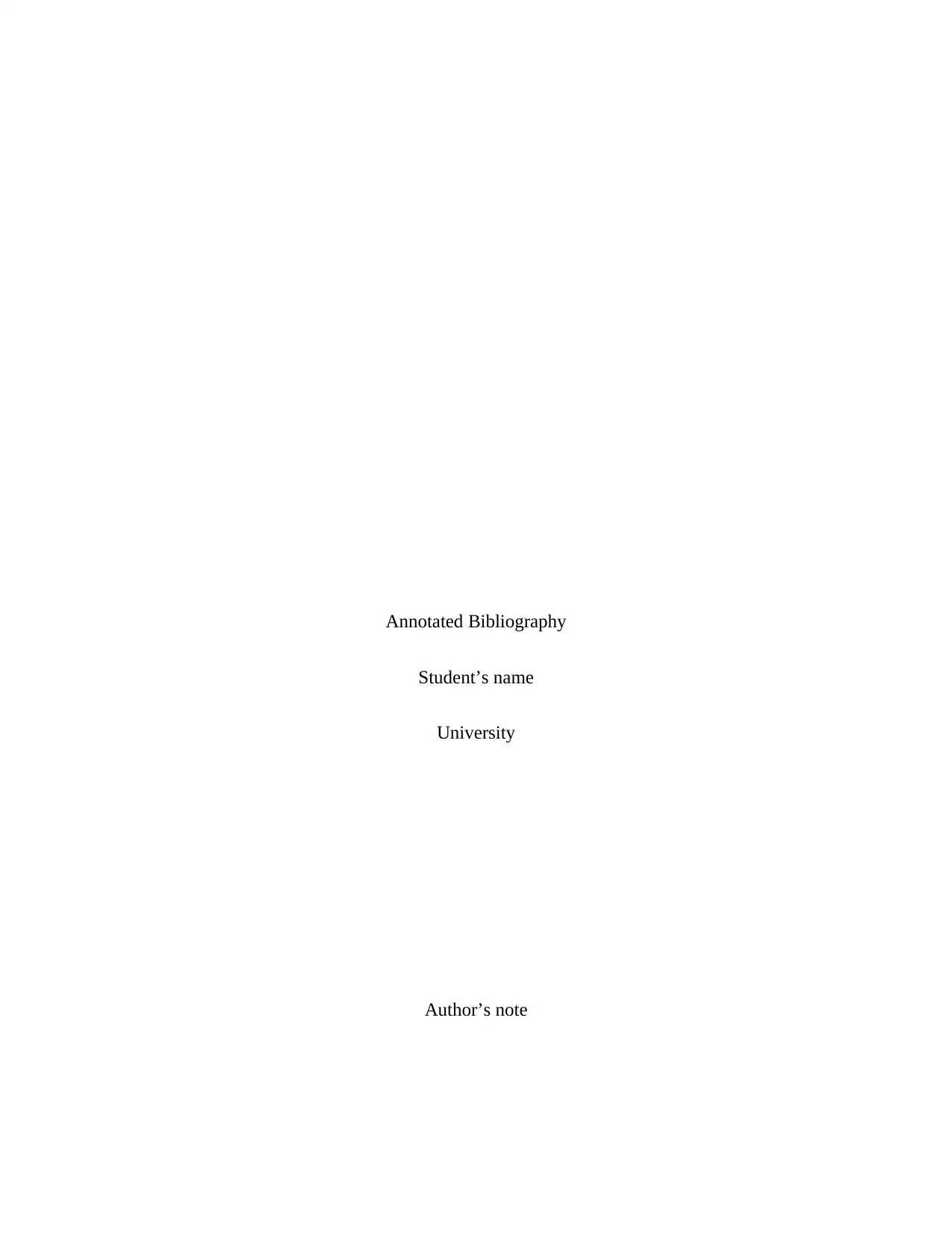
Annotated Bibliography
Student’s name
University
Author’s note
Student’s name
University
Author’s note
Paraphrase This Document
Need a fresh take? Get an instant paraphrase of this document with our AI Paraphraser
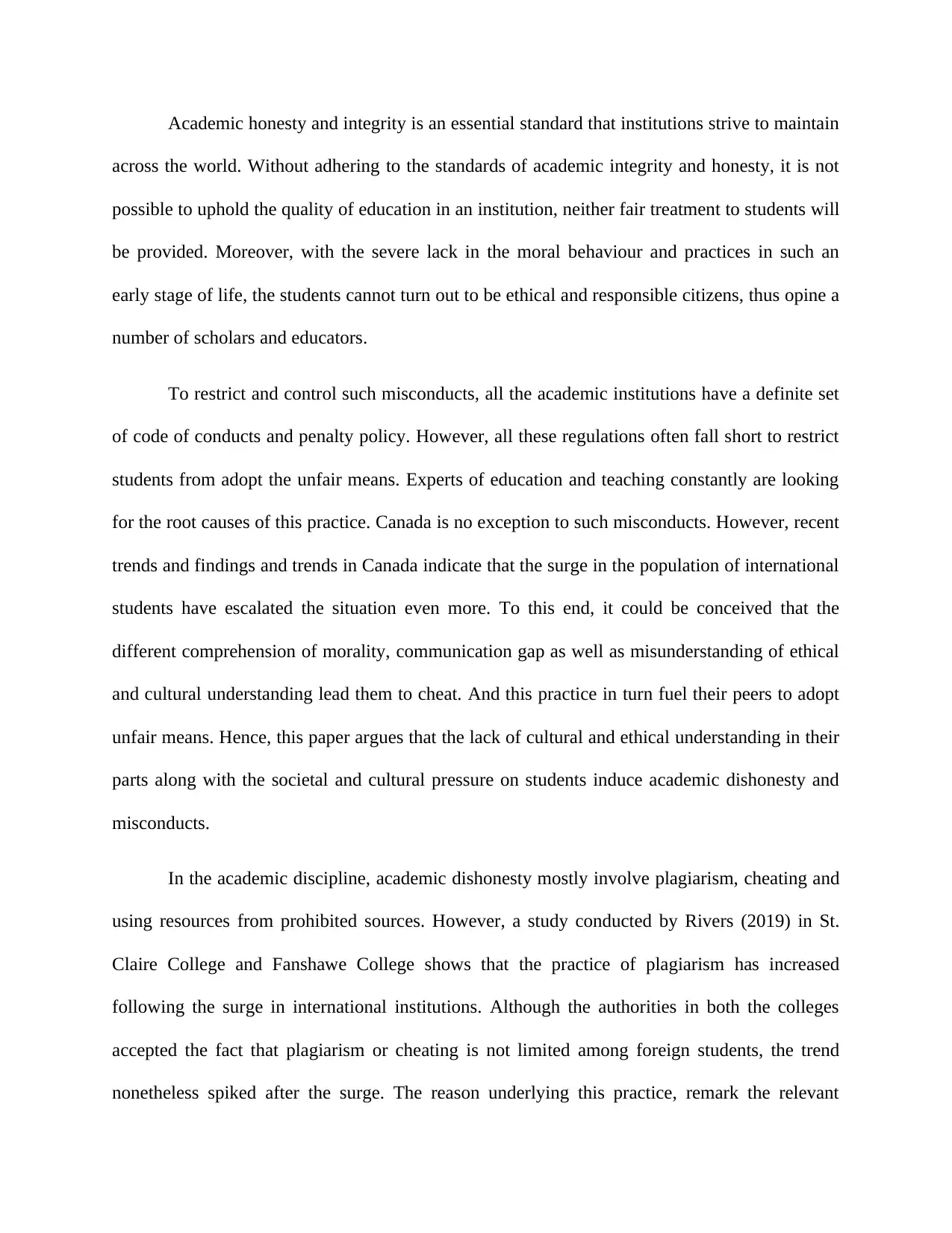
Academic honesty and integrity is an essential standard that institutions strive to maintain
across the world. Without adhering to the standards of academic integrity and honesty, it is not
possible to uphold the quality of education in an institution, neither fair treatment to students will
be provided. Moreover, with the severe lack in the moral behaviour and practices in such an
early stage of life, the students cannot turn out to be ethical and responsible citizens, thus opine a
number of scholars and educators.
To restrict and control such misconducts, all the academic institutions have a definite set
of code of conducts and penalty policy. However, all these regulations often fall short to restrict
students from adopt the unfair means. Experts of education and teaching constantly are looking
for the root causes of this practice. Canada is no exception to such misconducts. However, recent
trends and findings and trends in Canada indicate that the surge in the population of international
students have escalated the situation even more. To this end, it could be conceived that the
different comprehension of morality, communication gap as well as misunderstanding of ethical
and cultural understanding lead them to cheat. And this practice in turn fuel their peers to adopt
unfair means. Hence, this paper argues that the lack of cultural and ethical understanding in their
parts along with the societal and cultural pressure on students induce academic dishonesty and
misconducts.
In the academic discipline, academic dishonesty mostly involve plagiarism, cheating and
using resources from prohibited sources. However, a study conducted by Rivers (2019) in St.
Claire College and Fanshawe College shows that the practice of plagiarism has increased
following the surge in international institutions. Although the authorities in both the colleges
accepted the fact that plagiarism or cheating is not limited among foreign students, the trend
nonetheless spiked after the surge. The reason underlying this practice, remark the relevant
across the world. Without adhering to the standards of academic integrity and honesty, it is not
possible to uphold the quality of education in an institution, neither fair treatment to students will
be provided. Moreover, with the severe lack in the moral behaviour and practices in such an
early stage of life, the students cannot turn out to be ethical and responsible citizens, thus opine a
number of scholars and educators.
To restrict and control such misconducts, all the academic institutions have a definite set
of code of conducts and penalty policy. However, all these regulations often fall short to restrict
students from adopt the unfair means. Experts of education and teaching constantly are looking
for the root causes of this practice. Canada is no exception to such misconducts. However, recent
trends and findings and trends in Canada indicate that the surge in the population of international
students have escalated the situation even more. To this end, it could be conceived that the
different comprehension of morality, communication gap as well as misunderstanding of ethical
and cultural understanding lead them to cheat. And this practice in turn fuel their peers to adopt
unfair means. Hence, this paper argues that the lack of cultural and ethical understanding in their
parts along with the societal and cultural pressure on students induce academic dishonesty and
misconducts.
In the academic discipline, academic dishonesty mostly involve plagiarism, cheating and
using resources from prohibited sources. However, a study conducted by Rivers (2019) in St.
Claire College and Fanshawe College shows that the practice of plagiarism has increased
following the surge in international institutions. Although the authorities in both the colleges
accepted the fact that plagiarism or cheating is not limited among foreign students, the trend
nonetheless spiked after the surge. The reason underlying this practice, remark the relevant
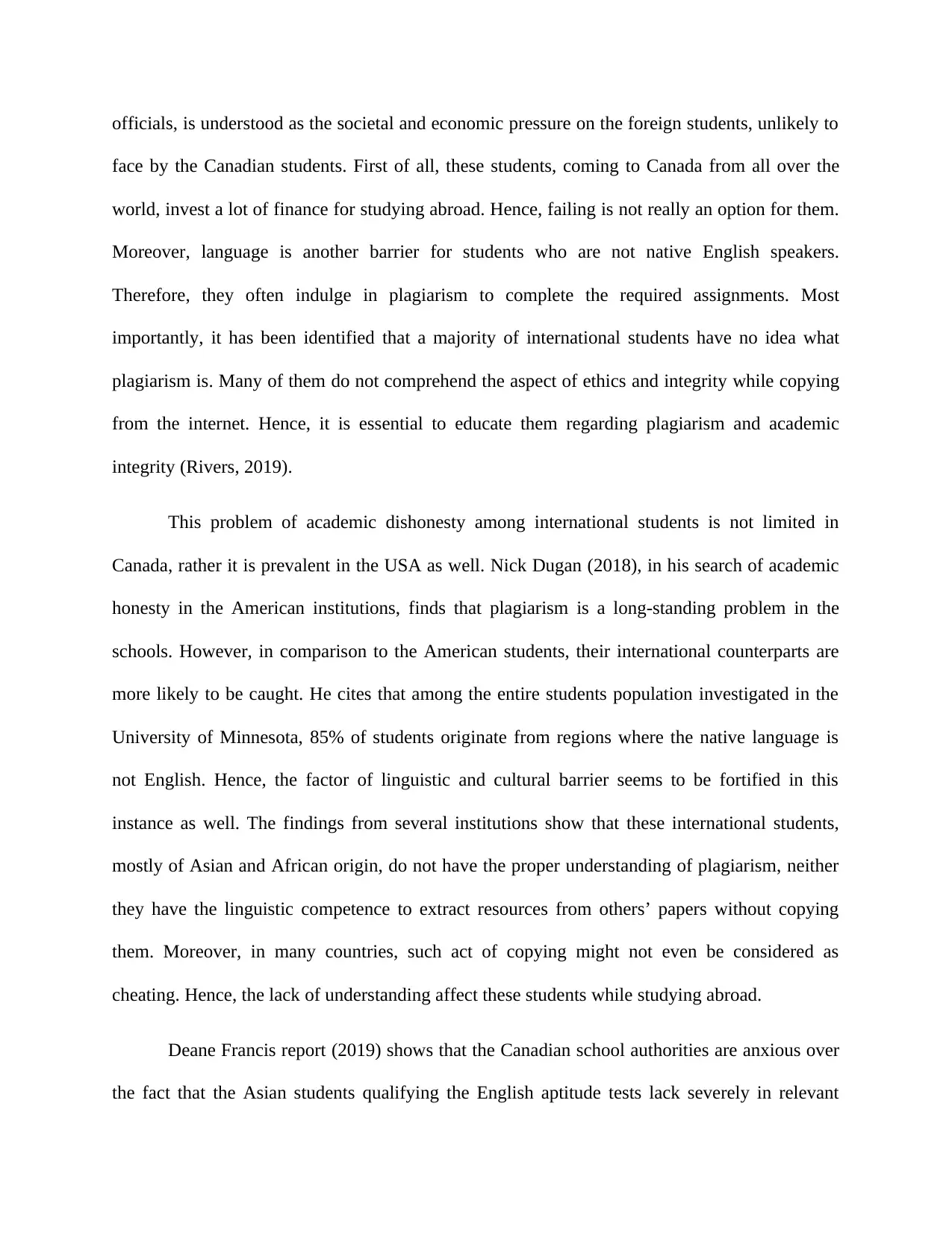
officials, is understood as the societal and economic pressure on the foreign students, unlikely to
face by the Canadian students. First of all, these students, coming to Canada from all over the
world, invest a lot of finance for studying abroad. Hence, failing is not really an option for them.
Moreover, language is another barrier for students who are not native English speakers.
Therefore, they often indulge in plagiarism to complete the required assignments. Most
importantly, it has been identified that a majority of international students have no idea what
plagiarism is. Many of them do not comprehend the aspect of ethics and integrity while copying
from the internet. Hence, it is essential to educate them regarding plagiarism and academic
integrity (Rivers, 2019).
This problem of academic dishonesty among international students is not limited in
Canada, rather it is prevalent in the USA as well. Nick Dugan (2018), in his search of academic
honesty in the American institutions, finds that plagiarism is a long-standing problem in the
schools. However, in comparison to the American students, their international counterparts are
more likely to be caught. He cites that among the entire students population investigated in the
University of Minnesota, 85% of students originate from regions where the native language is
not English. Hence, the factor of linguistic and cultural barrier seems to be fortified in this
instance as well. The findings from several institutions show that these international students,
mostly of Asian and African origin, do not have the proper understanding of plagiarism, neither
they have the linguistic competence to extract resources from others’ papers without copying
them. Moreover, in many countries, such act of copying might not even be considered as
cheating. Hence, the lack of understanding affect these students while studying abroad.
Deane Francis report (2019) shows that the Canadian school authorities are anxious over
the fact that the Asian students qualifying the English aptitude tests lack severely in relevant
face by the Canadian students. First of all, these students, coming to Canada from all over the
world, invest a lot of finance for studying abroad. Hence, failing is not really an option for them.
Moreover, language is another barrier for students who are not native English speakers.
Therefore, they often indulge in plagiarism to complete the required assignments. Most
importantly, it has been identified that a majority of international students have no idea what
plagiarism is. Many of them do not comprehend the aspect of ethics and integrity while copying
from the internet. Hence, it is essential to educate them regarding plagiarism and academic
integrity (Rivers, 2019).
This problem of academic dishonesty among international students is not limited in
Canada, rather it is prevalent in the USA as well. Nick Dugan (2018), in his search of academic
honesty in the American institutions, finds that plagiarism is a long-standing problem in the
schools. However, in comparison to the American students, their international counterparts are
more likely to be caught. He cites that among the entire students population investigated in the
University of Minnesota, 85% of students originate from regions where the native language is
not English. Hence, the factor of linguistic and cultural barrier seems to be fortified in this
instance as well. The findings from several institutions show that these international students,
mostly of Asian and African origin, do not have the proper understanding of plagiarism, neither
they have the linguistic competence to extract resources from others’ papers without copying
them. Moreover, in many countries, such act of copying might not even be considered as
cheating. Hence, the lack of understanding affect these students while studying abroad.
Deane Francis report (2019) shows that the Canadian school authorities are anxious over
the fact that the Asian students qualifying the English aptitude tests lack severely in relevant
⊘ This is a preview!⊘
Do you want full access?
Subscribe today to unlock all pages.

Trusted by 1+ million students worldwide
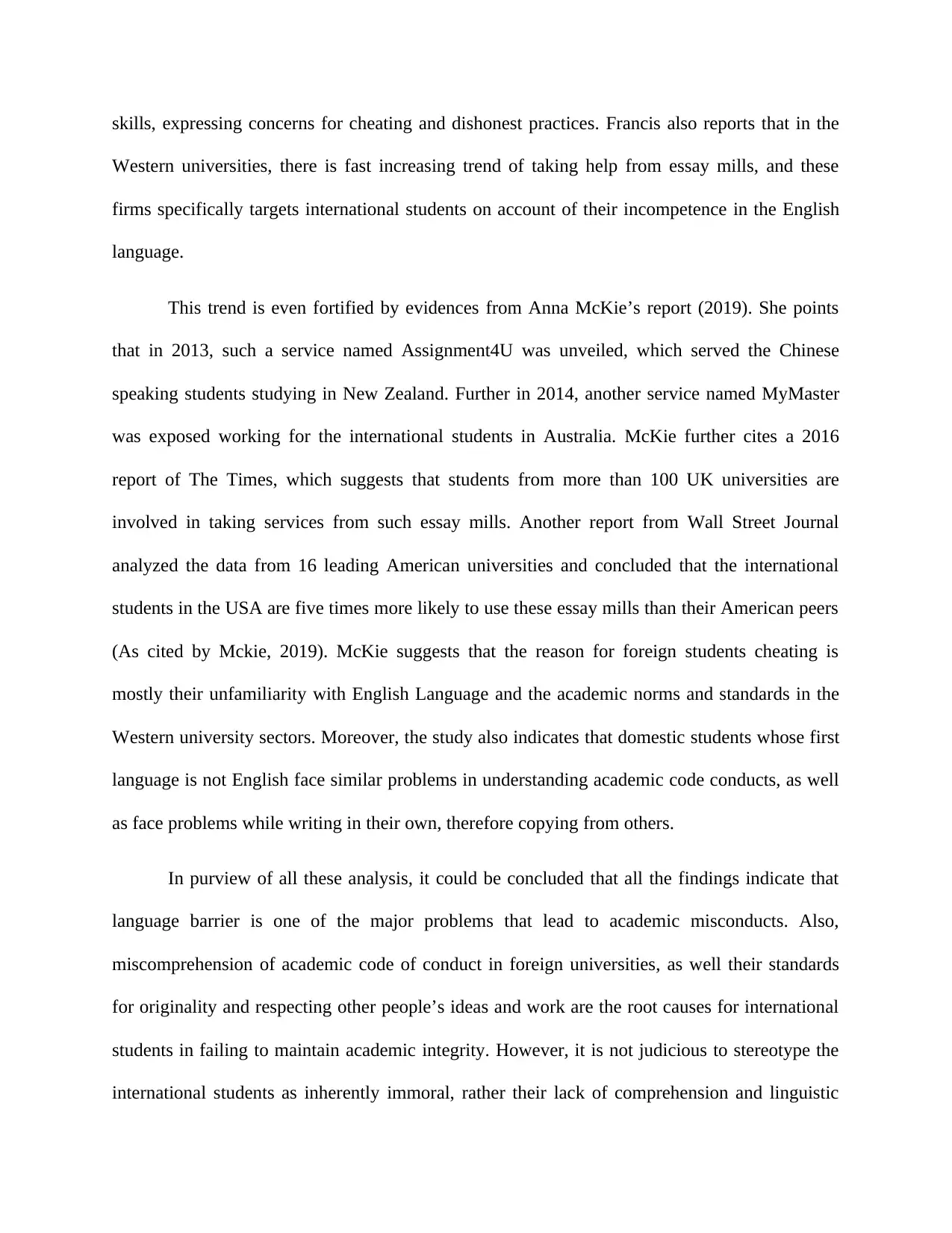
skills, expressing concerns for cheating and dishonest practices. Francis also reports that in the
Western universities, there is fast increasing trend of taking help from essay mills, and these
firms specifically targets international students on account of their incompetence in the English
language.
This trend is even fortified by evidences from Anna McKie’s report (2019). She points
that in 2013, such a service named Assignment4U was unveiled, which served the Chinese
speaking students studying in New Zealand. Further in 2014, another service named MyMaster
was exposed working for the international students in Australia. McKie further cites a 2016
report of The Times, which suggests that students from more than 100 UK universities are
involved in taking services from such essay mills. Another report from Wall Street Journal
analyzed the data from 16 leading American universities and concluded that the international
students in the USA are five times more likely to use these essay mills than their American peers
(As cited by Mckie, 2019). McKie suggests that the reason for foreign students cheating is
mostly their unfamiliarity with English Language and the academic norms and standards in the
Western university sectors. Moreover, the study also indicates that domestic students whose first
language is not English face similar problems in understanding academic code conducts, as well
as face problems while writing in their own, therefore copying from others.
In purview of all these analysis, it could be concluded that all the findings indicate that
language barrier is one of the major problems that lead to academic misconducts. Also,
miscomprehension of academic code of conduct in foreign universities, as well their standards
for originality and respecting other people’s ideas and work are the root causes for international
students in failing to maintain academic integrity. However, it is not judicious to stereotype the
international students as inherently immoral, rather their lack of comprehension and linguistic
Western universities, there is fast increasing trend of taking help from essay mills, and these
firms specifically targets international students on account of their incompetence in the English
language.
This trend is even fortified by evidences from Anna McKie’s report (2019). She points
that in 2013, such a service named Assignment4U was unveiled, which served the Chinese
speaking students studying in New Zealand. Further in 2014, another service named MyMaster
was exposed working for the international students in Australia. McKie further cites a 2016
report of The Times, which suggests that students from more than 100 UK universities are
involved in taking services from such essay mills. Another report from Wall Street Journal
analyzed the data from 16 leading American universities and concluded that the international
students in the USA are five times more likely to use these essay mills than their American peers
(As cited by Mckie, 2019). McKie suggests that the reason for foreign students cheating is
mostly their unfamiliarity with English Language and the academic norms and standards in the
Western university sectors. Moreover, the study also indicates that domestic students whose first
language is not English face similar problems in understanding academic code conducts, as well
as face problems while writing in their own, therefore copying from others.
In purview of all these analysis, it could be concluded that all the findings indicate that
language barrier is one of the major problems that lead to academic misconducts. Also,
miscomprehension of academic code of conduct in foreign universities, as well their standards
for originality and respecting other people’s ideas and work are the root causes for international
students in failing to maintain academic integrity. However, it is not judicious to stereotype the
international students as inherently immoral, rather their lack of comprehension and linguistic
Paraphrase This Document
Need a fresh take? Get an instant paraphrase of this document with our AI Paraphraser
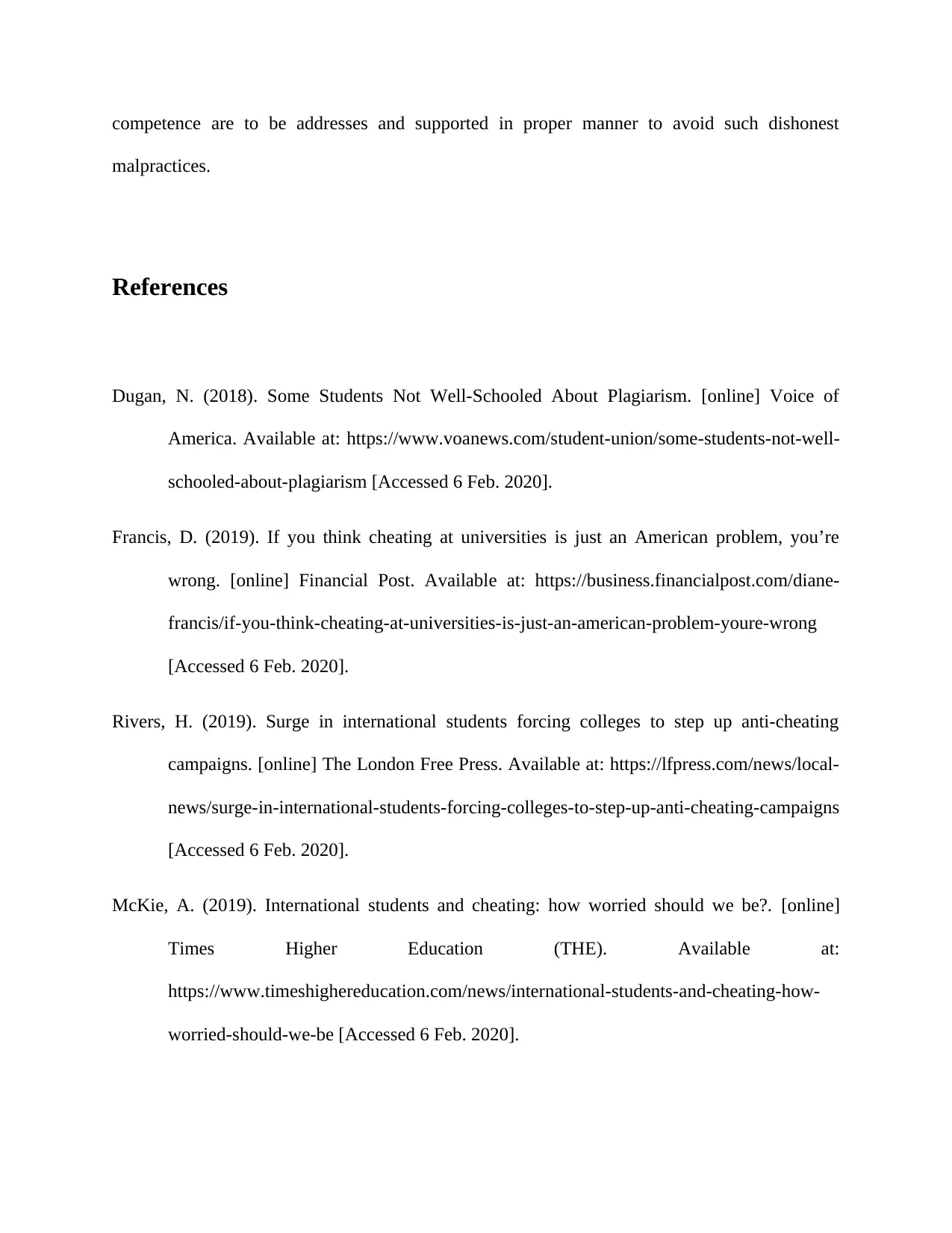
competence are to be addresses and supported in proper manner to avoid such dishonest
malpractices.
References
Dugan, N. (2018). Some Students Not Well-Schooled About Plagiarism. [online] Voice of
America. Available at: https://www.voanews.com/student-union/some-students-not-well-
schooled-about-plagiarism [Accessed 6 Feb. 2020].
Francis, D. (2019). If you think cheating at universities is just an American problem, you’re
wrong. [online] Financial Post. Available at: https://business.financialpost.com/diane-
francis/if-you-think-cheating-at-universities-is-just-an-american-problem-youre-wrong
[Accessed 6 Feb. 2020].
Rivers, H. (2019). Surge in international students forcing colleges to step up anti-cheating
campaigns. [online] The London Free Press. Available at: https://lfpress.com/news/local-
news/surge-in-international-students-forcing-colleges-to-step-up-anti-cheating-campaigns
[Accessed 6 Feb. 2020].
McKie, A. (2019). International students and cheating: how worried should we be?. [online]
Times Higher Education (THE). Available at:
https://www.timeshighereducation.com/news/international-students-and-cheating-how-
worried-should-we-be [Accessed 6 Feb. 2020].
malpractices.
References
Dugan, N. (2018). Some Students Not Well-Schooled About Plagiarism. [online] Voice of
America. Available at: https://www.voanews.com/student-union/some-students-not-well-
schooled-about-plagiarism [Accessed 6 Feb. 2020].
Francis, D. (2019). If you think cheating at universities is just an American problem, you’re
wrong. [online] Financial Post. Available at: https://business.financialpost.com/diane-
francis/if-you-think-cheating-at-universities-is-just-an-american-problem-youre-wrong
[Accessed 6 Feb. 2020].
Rivers, H. (2019). Surge in international students forcing colleges to step up anti-cheating
campaigns. [online] The London Free Press. Available at: https://lfpress.com/news/local-
news/surge-in-international-students-forcing-colleges-to-step-up-anti-cheating-campaigns
[Accessed 6 Feb. 2020].
McKie, A. (2019). International students and cheating: how worried should we be?. [online]
Times Higher Education (THE). Available at:
https://www.timeshighereducation.com/news/international-students-and-cheating-how-
worried-should-we-be [Accessed 6 Feb. 2020].
1 out of 5
Related Documents
Your All-in-One AI-Powered Toolkit for Academic Success.
+13062052269
info@desklib.com
Available 24*7 on WhatsApp / Email
![[object Object]](/_next/static/media/star-bottom.7253800d.svg)
Unlock your academic potential
Copyright © 2020–2026 A2Z Services. All Rights Reserved. Developed and managed by ZUCOL.




